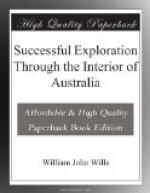In 1851, I took my son to London to show him the Great Exhibition. His chief attractions there, were the instruments and mechanical inventions. If, after a day or two, I chanced to deviate from the leading thoroughfares and missed my way, he would set me right in a moment. This was rather mortifying to one who fancied himself well acquainted with London from frequent visits, but he smiled when he saw I was not a true guide. I asked him how he acquired this apt knowledge. “On the second day,” he replied, “when you were out, I took the map and studied it for two hours, so that now I am well versed in it.” My subsequent experience made me think he had some instinctive power in matters like these, such as horses and carrier-pigeons possess, for the darkest night never baulked him. On a visit to Windsor, being told that it was considered a feat to climb the statue of King George the Third at the end of the long walk, he accomplished it in a very short time. At Hampton Court he unravelled the mystery of the Maze in ten minutes and grew quite familiar with all its ins and outs.
In the following spring, 1852, I took him again to London, at the opening of the session for medical students. As there was no anatomical class he studied that branch of science by visiting the museum at Guy’s. Having myself been a student at that school, I introduced him to my late respected teacher, Charles Aston King, Esquire, through whom he obtained permission to attend. Surgical operations he witnessed at the theatres of any hospital on the regular days. The only class he entered was that of practical chemistry, under Dr. John Stenhouse, LL.D., at Bartholomew’s. When the course had nearly terminated, I saw Dr. Stenhouse, and inquired whether my son evinced any particular talent in that line. Dr. Stenhouse came from the lecture-room, and walked with me through Newgate-Street into Cheapside, earnestly requesting me not to take from him one of the most promising pupils he had ever had. “I venture an assurance,” he said, “that in two years, in practical chemistry, he will be second to few in England.” Dr. Stenhouse at that time was engaged in analyzing the different articles of food sold in the shops, and found my son useful and suggestive. His testimonial ran thus:—
I have much pleasure in certifying that Mr. W.J. Wills attended a course of practical chemistry at this medical school during the summer season of 1852. He obtained considerable proficiency, and invariably distinguished himself by great propriety of conduct.
(Signed) John Stenhouse LL.D., Lecturer to the Medical School of St. Bartholomew’s Hospital,
September 1st, 1852.
At the house where he lodged, kept by an old couple and their servant, he was as one of themselves, and amused them greatly by the discoveries he made of the tricks practised by vendors of goods in the street; tricks they had no idea of, although they had lived in London all their lives. They used to say he would be a great genius in the detective department of the Police.




